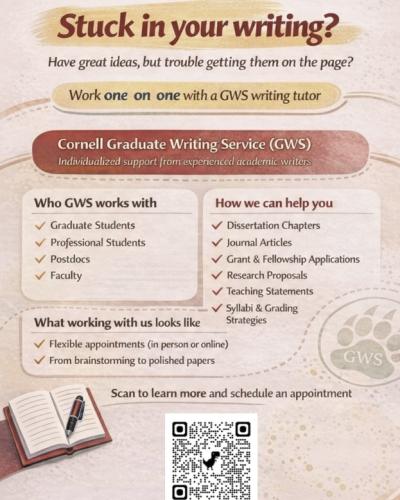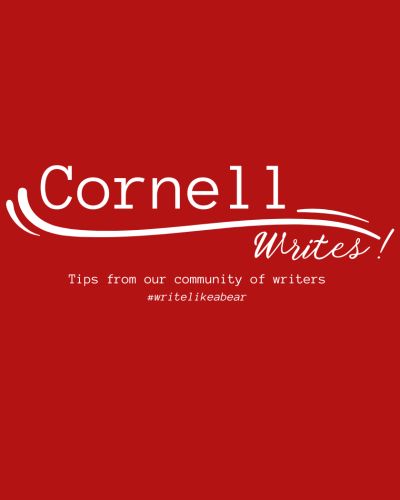Cornell Writes! Tips from our community of writers is a digital newsletter sponsored by the Knight Institute for Writing in the Disciplines and the Cornell University Graduate School.
Each week, a member of our writing community – a Graduate Writing Service, English Language Support Office, or Cornell Writing Centers tutor; a writing specialist from the Knight Institute; a writing instructor from our First-Year Writing Seminars or Writing in the Majors programs; maybe YOU – will share a writing strategy from their own writer’s toolkit. #writelikeabear
Contact Tracy Hamler Carrick with questions and ideas.
A few weeks ago, Tracy Carrick shared a short Cornell Writes! piece titled "It's okay if you cannot write today." For those of us who have taken more than a few of those necessary days off and who need some help getting back to writing or getting back to consistent writing habits, we are reposting Kate Navickas's popular piece on Process Journaling from our inaugural semester.
Meet Kate Navickas
Hello Cornell Writers! My name is Kate Navickas. I teach writing and direct the Cornell Writing Centers. And, I am always writing something–example analysis paragraphs to use with students in class, writing center social media posts or promotional website articles, and even the occasional journal article or conference paper.
Here is this week’s Writing Tip!
When I was writing my dissertation in 2015, I would have one really great day of in-the-zone writing followed by days of staring at my computer screen. I wasn’t necessarily distracted so much as I was just blank–dutifully sitting at my desk and staring at a blank screen. Sometimes, to feel productive, I would reread a chapter–a task that with enough dedication and editing might waste the entire day. To get through these days, I started doing two things:
- Process journaling with attention to my emotions
- Naming specific starting goals for the next day
Process Journaling
Almost out of frustration, I opened a google doc and started writing about exactly why I didn’t want to be writing, how tired I really was today, and why more coffee probably wouldn’t solve my problems. I allowed myself the space to vent–without judgment–about the intense emotional experience of writing that the dissertation can be. I also wrote about my frustrations with my particular chapter–I had been trying to answer a seemingly simple question my advisor had posed to me and I was, honestly, annoyed I had to answer it at all.
I gave myself one page of this emotional dumping and it was as if I suddenly had the bandwidth to focus again. It didn’t necessarily make writing easier, but it helped me start. I found that I needed to vent in this way–often saying the exact same thing each day–every single day at the start of my writing sessions. Although it often felt like a waste of time retyping similar feelings, the process acted like a clearing away that created space and helped me to focus.
Suggested Guiding Questions:
- How do I feel today? Why?
- What am I writing about today?
- How do I feel about what I’m writing about today? Why?
- How do I feel about where I’m at with this chapter/piece of writing?
Suggested Process Writing Rules:
- Allow yourself to write what you need to write, without judgment or editing
- Allow yourself to write badly–to repeat yourself, be dramatic, and most of all, to not have answers to important questions
- Set aside a regular time and place for your process writing–make it a part of your daily writing routine
- Don’t forget to also write about successes like positive feedback from your advisor or a great idea you have for a future chapter
In addition to clearing out the often negative emotions of writing, I also found that process journaling encouraged me to linger on generative ideas for chapters I hadn’t gotten to yet or the positive feedback from an advisor.
Naming Specific Starting Goals for the Next Day
At the end of each writing session, at the bottom of my process journal for the day, I would create a bulleted list of very specific tasks I needed to do the next day. This acted as a directive that encouraged me to not start a writing session by rereading the entire chapter, again. The goal of this to-do list is to be so specific you know exactly how to get started the next day. Here’s an example:
Tomorrow:
- Start on pg. 14
- Refine and finish section on diagramming and visualizing pedagogy
- Revise heuristic: it needs to be more about worldview
- Find an article on visualization (maybe Muller or Brooke?)





